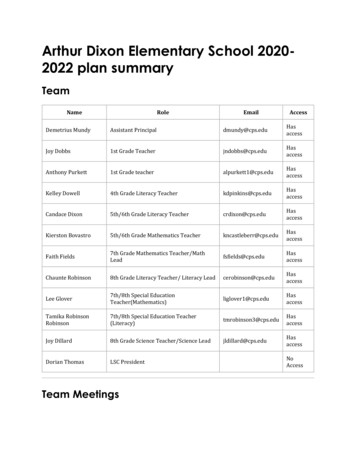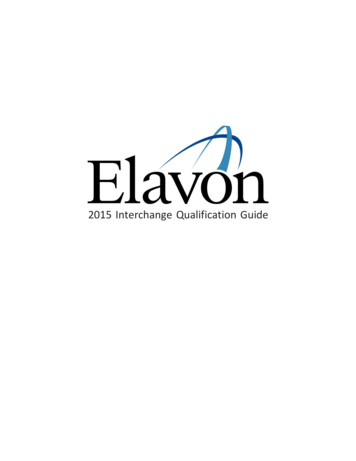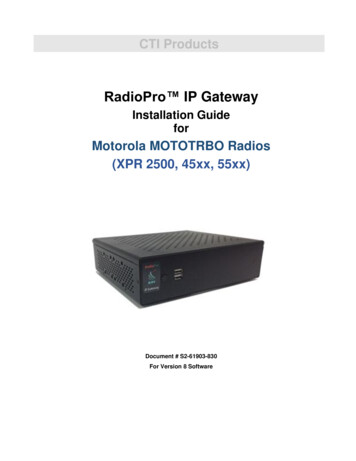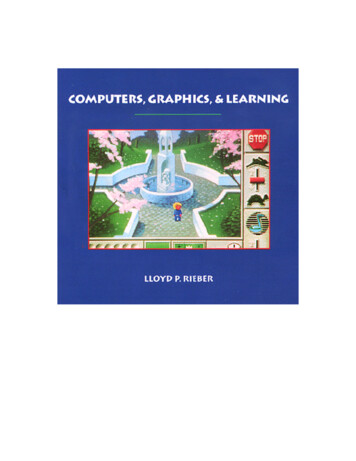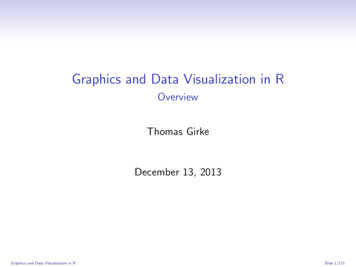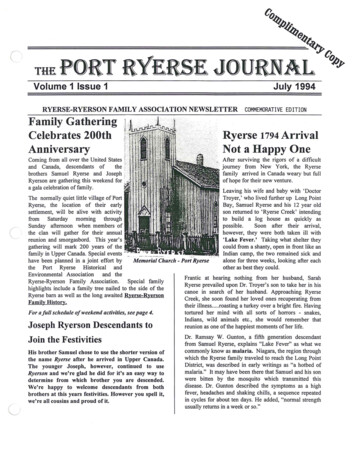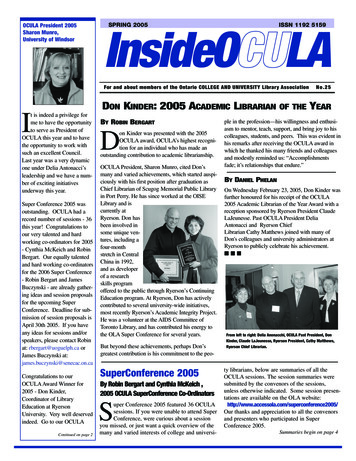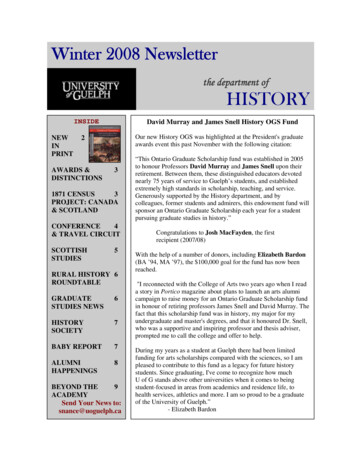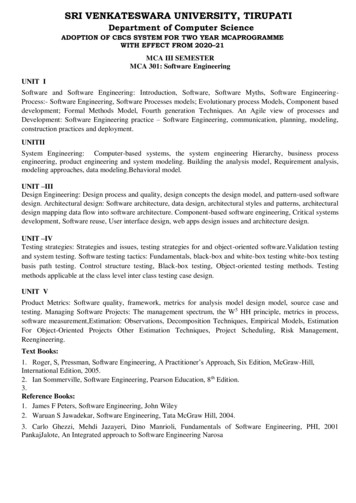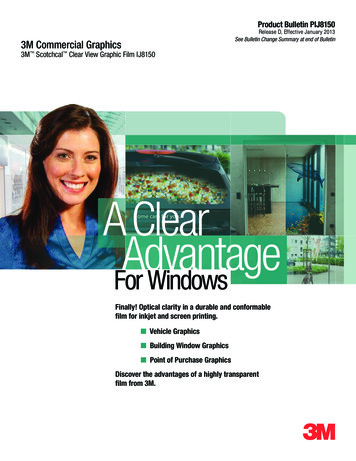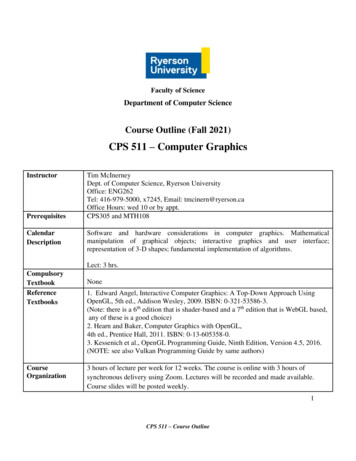
Transcription
Faculty of ScienceDepartment of Computer ScienceCourse Outline (Fall 2021)CPS 511 – Computer Tim McInerneyDept. of Computer Science, Ryerson UniversityOffice: ENG262Tel: 416-979-5000, x7245, Email: tmcinern@ryerson.caOffice Hours: wed 10 or by appt.CPS305 and MTH108Software and hardware considerations in computer graphics. Mathematicalmanipulation of graphical objects; interactive graphics and user interface;representation of 3-D shapes; fundamental implementation of algorithms.Lect: 3 nizationNone1. Edward Angel, Interactive Computer Graphics: A Top-Down Approach UsingOpenGL, 5th ed., Addison Wesley, 2009. ISBN: 0-321-53586-3.(Note: there is a 6th edition that is shader-based and a 7th edition that is WebGL based,any of these is a good choice)2. Hearn and Baker, Computer Graphics with OpenGL,4th ed., Prentice Hall, 2011. ISBN: 0-13-605358-0.3. Kessenich et al., OpenGL Programming Guide, Ninth Edition, Version 4.5, 2016.(NOTE: see also Vulkan Programming Guide by same authors)3 hours of lecture per week for 12 weeks. The course is online with 3 hours ofsynchronous delivery using Zoom. Lectures will be recorded and made available.Course slides will be posted weekly.1CPS 511 – Course Outline
LearningObjectivesEvaluation &FeedbackGradingrequirementsLabsAt the end of the course, a successful student will be able to:1. Understand basic principles, concepts, and mathematics of computer graphics2. Write modern OpenGL computer graphic programsAssignment 112%Assignment 212%Assignment 316%Midterm Test25%Week of Oct 18Final Exam35%Exam Week Results for midterms and assignments will be returned within 2 weeks of duedate.To pass the course you must get at least 50% of the total exam marks (midterm final)and 50% of the assignment marks. Rationale: a cumulative test score of 50% isdeemed insufficient for demonstrating a basic understanding of the course concepts.Students must demonstrate, via programming assignments, competency in writing ofmodern OpenGL computer graphics programs in order to meet Learning Objective #2.Not applicableInformationStudents require a PC or laptop.Technology andelectronic devicesEvaluationGuidelinesExample: The midterm test and final exam will contain short answer questions whichrequire students to solve problems and write algorithms.MissedEvaluationsWhen possible, students are required to inform their instructors of any situation whicharises during the semester which may have an adverse effect upon their academicperformance and must request any consideration and accommodation according to therelevant policies as far in advance as possible. Failure to do so may jeopardize anyacademic appeals. Health certificates – If a student misses the deadline for submitting anassignment, or the date of an exam or other evaluation component for healthreasons, they should notify their instructor as soon as possible, and submit aRyerson Student Health Certificate AND an Academic Consideration Request2CPS 511 – Course Outline
form within 3 working days of the missed date. Both documents are availableat www.ryerson.ca/senate/forms/medical.pdf. If you are a full-time or parttime degree student, then you submit your forms to your own programdepartment or school; otherwise, you submit your forms at the front desk ofthe Chang School of Continuing Education. Religious, Aboriginal and Spiritual observance – If a student needsaccommodation because of religious, Aboriginal or spiritual observance, theymust submit a Request for Accommodation of Student Religious, Aboriginaland Spiritual Observance AND an Academic Consideration Request formwithin the first 2 weeks of the class or, for a final examination, within 2 weeksof the posting of the examination schedule. If the requested absence occurswithin the first 2 weeks of classes, or the dates are not known well in advanceas they are linked to other conditions, these forms should be submitted with asmuch lead time as possible in advance of the absence. Both documents areavailable at str.pdf. If youare a full-time or part-time degree student, then you submit the forms to yourown program department or school. If you are a certificate or non-certificatestudent, then you submit the forms to the staff at the front desk of the ChangSchool. Academic Accommodation Support – Before the first graded work is due,students registered with the Academic Accommodation Support office (AAS)should provide their instructors with an Academic Accommodation letter thatdescribes their academic accommodation plan.Communicationwith StudentsCourseContentRyerson’s email policy pol157.pdfstates that only Ryerson e-mail accounts are to be used for communication withstudents. All students, including continuing education students, have access toRyerson email through their my.ryerson.ca site, and this is the official way in whichthey receive communication. All students are required to register for and maintain thisaccount. Emails sent from other accounts may not be answered!*dates and topics are approximate#WEEK OFTOPIC1Sep. 6Introduction IIntroduction II: Graphics Systems and the Graphics Pipeline2Sep. 13Introduction to OpenGL programming and GPU programming3Sep. 20Geometric Transformations in 2D and 3D4Sep. 27Viewing and Projection5Oct. 4Viewing and Projection continued3CPS 511 – Course Outline
AcademicPolicies andProceduresAcademicIntegrityOct. 11Study Week – No lectures6Oct. 183D Object Modeling, Midterm Exam7Oct. 25Lighting and Shading8Nov. 1GPU Programming (Shaders)9Nov. 8Discrete Techniques (Texture Mapping etc.)10 Nov. 15From Vertices to Fragments11 Nov. 22Advanced Rendering12 Nov. 29Special Topic in Computer Graphics- Information must be given on all relevant department/school/program policies,e.g., guidelines regarding group work, course variations that are appropriateamong different sections of the same course, class attendance- Students are required to adhere to all relevant university policies found in theironline course shell in D2L and/or on the following esRyerson’s Policy 60 (the Academic Integrity policy) applies to all students at theUniversity. Forms of academic misconduct include plagiarism, cheating, supplyingfalse information to the University, and other acts. The most common form ofacademic misconduct is plagiarism – a serious academic offence, with potentiallysevere penalties and other consequences. It is expected, therefore, that allexaminations and work submitted for evaluation and course credit will be the productof each student’s individual effort (or an authorized group of students). Submittingthe same work for credit to more than one course, without instructor approval, canalso be considered a form of plagiarism.Suspicions of academic misconduct may be referred to the Academic Integrity Office(AIO). Students who are found to have committed academic misconduct will have aDisciplinary Notation (DN) placed on their academic record (not on their transcript)and will normally be assigned one or more of the following penalties: A grade reduction for the work, ranging up to an including a zero on the work(minimum penalty for graduate work is a zero on the work) A grade reduction in the course greater than a zero on the work. (Note thatthis penalty can only be applied to course components worth 10% or less, andany additional penalty cannot exceed 10% of the final course grade. Studentsmust be given prior notice that such a penalty will be assigned (e.g. in thecourse outline or on the assignment handout) An F in the course More serious penalties up to and including expulsion from the UniversityThe unauthorized use of intellectual property of others, including your professor, for4CPS 511 – Course Outline
distribution, sale, or profit is expressly prohibited, in accordance with Policy 60(Sections 2.8 and 2.10). Intellectual property includes, but is not limited to: SlidesLecture notesPresentation materials used in and outside of classLab manualsCourse packsExamsFor more detailed information on these issues, please refer to the Academic Integritypolicy and to the Academic Integrity Office website.AutomaticPlagiarismDetectionDiversity andInclusionStatementImportantresourcesIf you are using a plagiarism detection service that retains a copy of the submittedwork in its database you must include either the following statement: “Students whodo not want their work submitted to this plagiarism detection service must, by the endof the second week of class, consult with the instructor to make alternatearrangements.”; or the details of alternate arrangements including the deadlines forconsultation with the instructor concerning the use of these arrangements.In this course I would like to create a learning environment that supports a diversity ofthoughts, perspectives and experiences, and honors your identities (including race,gender, class, sexuality, religion, ability, etc.) For more information about ourUniversity’s resources and services on Equity, Diversity, and Inclusion please visithttps://www.ryerson.ca/equity/ The Library provides research workshops and individual assistance. Inquire atthe Reference Desk on the second floor of the library, or go towww.ryerson.ca/library/info/workshops.html Student Learning x.html) offers group-based andindividual help with writing, math, study skills and transition support. Accommodation SupportRyerson University acknowledges that students have diverse learning stylesand a variety of academic needs. If you have a diagnosed disability thatimpacts your academic experience, connect with Academic AccommodationSupport (AAS). Visit the AAS website or contact aasadmin@ryerson.ca formore information.Note: All communication with AAS is voluntary and confidential, and will notappear on your transcript.5CPS 511 – Course Outline
Dept. of Computer Science, Ryerson University Office: ENG262 Tel: 416-979-5000, x7245, Email: tmcinern@ryerson.ca Office Hours: wed 10 or by appt. Prerequisites CPS305 and MTH108 Calendar Description Software and hardware considerations in computer graphics. Mathematical
